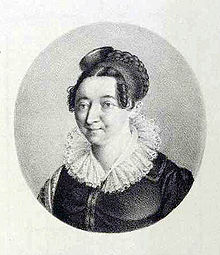Yelisaveta Semyonovna Sandunova
Jelisaveta Semjonowna Sandunowa b. Uranowa ( Russian Елизавета Семёновна Сандунова урождённая Уранова ; * 1772 ; † December 3 July / December 15, 1826 greg. In Moscow ) was a Russian actress and opera singer .
Life
Jelisaveta graduated from the St. Petersburg Theater School . Her singing teachers were Giovanni Paisiello , Vicente Martín y Soler and Giuseppe Sarti . She studied dramatic art under the direction of Ivan Dmitrevsky . From 1790 she was on the stage. She not only had an extraordinarily beautiful voice ( lyrical- dramatic soprano / mezzo-soprano ), but was also an expressive actress.
Yelisaveta became widely known through the story of her marriage. Count Alexander Besborodko intended a relationship with her and initially prevented her marriage to Sila Sandunow , actor and entrepreneur, brother of the lawyer Nikolai Sandunow and founder of the Moscow Sandunowskie Bani . After a performance in the St. Petersburg Hermitage Theater, Jelisaveta turned directly to Empress Catherine II with a request for help. The Empress dismissed the theater directors AV Khropovitsky and Soimonov, who had turned a blind eye to Besborodko's claims. Now Jelisaveta and Sila Sandunow were on February 14th July. / February 25, 1791 greg. married in the court church in the presence of the empress, who removed the maiden wreath from Jelisaveta. This story went down in Alexander Pushkin's novel The Captain's Daughter.
In 1794 the Sandunovs moved to Moscow. Yelisaveta's best role on the Moscow stage was the boyar's daughter Nastasja in the opera Старинные святки by the Czech Franz Xaver Blimà. Her appearance in this role in 1812 was particularly acclaimed.
After the war in 1812 , the Sandunovs returned to St. Petersburg in 1813. Here Jelisaveta's best role was the Delia in the opera La vestale by Gaspare Spontini . She sang in Lesta The Donauweibchen of Ferdinand Kauer and the Queen of the Night in Mozart's The Magic Flute . For the comic role in Mozart's La clemenza di Tito she won the still unknown Vasily Ryazantsev . She also sang Russian folk songs in concerts.
Individual evidence
- ↑ Peoples.Ru: Елизавета Сандунова Elizaveta Sandunova (accessed September 26, 2016).
- ↑ А. Н. Сиротинин: Сандуновы. (Очерк из истории русского театра) . In: Исторический вестник . tape 37 , no. 9 , 1889, pp. 550-576 .
- ↑ Е. Н. Опочинин: К биографии Сандуновых . In: Исторический вестник . tape 38 , no. 11 , 1889, p. 342-355 .
- ↑ А. Н. Сиротинин: Новые сведения о Сандуновых . In: Исторический вестник . tape 39 , no. 3 , 1890, p. 611-625 .
- ↑ Алексей Лопатин: Елизавета Сандукова, Лола Монтес, Настасья Филипповна? История Одного Жеста . In: Петербургский театральный журнал . No. 32 , 2003.
- ↑ Н. Ф. Финдейзен: Очерки по истории музыки в России с древнейших времен до конца XVIII века (Volume 2) . Moscow 1929, p. 238 .
- ↑ Л. В. Маньковой: Судьба таланта. Театр в дореволюционной России . Правда, Moscow 1990, ISBN 5-253-00109-3 , pp. 9 .
| personal data | |
|---|---|
| SURNAME | Sandunowa, Jelisaveta Semyonovna |
| ALTERNATIVE NAMES | Сандунова, Елизавета Семёновна (Russian); Uranova, Jelisaveta Semyonovna |
| BRIEF DESCRIPTION | Russian actress and opera singer |
| DATE OF BIRTH | 1772 |
| DATE OF DEATH | December 15, 1826 |
| Place of death | Moscow |
